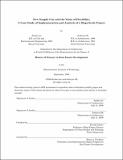| dc.contributor.advisor | David Geltner. | en_US |
| dc.contributor.author | Lee, Junho (Junho Justin) | en_US |
| dc.contributor.author | Oh, Jeehyun | en_US |
| dc.contributor.other | Massachusetts Institute of Technology. Center for Real Estate. | en_US |
| dc.coverage.spatial | a-ko--- | en_US |
| dc.date.accessioned | 2010-09-22T16:03:32Z | |
| dc.date.available | 2010-09-22T16:03:32Z | |
| dc.date.copyright | 2008 | en_US |
| dc.date.issued | 2008 | en_US |
| dc.identifier.uri | http://hdl.handle.net/1721.1/58657 | |
| dc.description | Thesis (S.M. in Real Estate Development)--Massachusetts Institute of Technology, Dept. of Architecture, Center for Real Estate, 2008. | en_US |
| dc.description | This electronic version was submitted by the student author. The certified thesis is available in the Institute Archives and Special Collections. | en_US |
| dc.description | Includes bibliographical references (p. 74-75). | en_US |
| dc.description.abstract | In the modern real estate industry, mega-scale developments have been a notable feature. The distinctiveness of these projects is that they are enormous in scale and thus require many years to develop. Unlike regular sized projects, they have greater opportunities to alter strategies, plans or designs during the multiple years of development. This provides the developer with alternative options to mitigate potential risks or seize upside opportunities. The "Real options" theory is especially applicable for valuation and decisionmaking of mega-scale real estate development projects. Relying on the dynamic decisions of the developer, for example, the project can proceed, be delayed or be abandoned. Either way, the developer can avoid downside risks and attain a more optimal value for the project. The New Songdo City (NSC) project in South Korea is an archetype of the mega-scale development phenomenon. "New Songdo City" is a massive city development project on 1,415 acres of reclaimed land in Incheon, near Seoul. The project features innovative and valuable aspects that are milestones for the real estate industry. Not only is NSC of megascale and multi-phase, but it is highly international in nature (foreign lead developer and architect, much foreign capital, and aimed at international world-class occupants). It also features imaginative conceptual planning, local and international developer partnership and sophisticated investment and financing techniques. The project highlights the importance of the interaction of local circumstances and other participants, helping to avoid risks and enhance the future values of the project. New Songdo City thus provides an excellent laboratory to explore both the broader strategic and historical development of a Mega-Project and also the applicability of modern, cutting- edge analytical tools for valuing flexibility in project design and implementation. | en_US |
| dc.description.abstract | (cont.) This thesis seeks to explore both of these aspects, including an in-depth review of the history and strategic prospects for the project as well as a specific quantitative model focusing on the value of phasing in the project. The quantitative model is innovative in that, while previous literature has developed classical economics-based real options models of NSC, this is the first application of the "engineering-based approach" advocated by Professor de Neufville and the MIT Engineering Systems Division. This approach allows the model to be more transparent and user-friendly to decision-makers, assisting the valuation of flexibility in the project in a manner more supportive for practitioners. | en_US |
| dc.description.statementofresponsibility | by Junho Lee and Jeehyun Oh. | en_US |
| dc.format.extent | 75 p. | en_US |
| dc.language.iso | eng | en_US |
| dc.publisher | Massachusetts Institute of Technology | en_US |
| dc.rights | M.I.T. theses are protected by
copyright. They may be viewed from this source for any purpose, but
reproduction or distribution in any format is prohibited without written
permission. See provided URL for inquiries about permission. | en_US |
| dc.rights.uri | http://dspace.mit.edu/handle/1721.1/7582 | en_US |
| dc.subject | Architecture. | en_US |
| dc.subject | Center for Real Estate. | en_US |
| dc.title | New Songdo City and the value of flexibility : a case study of implementation and analysis of a mega-scale project | en_US |
| dc.title.alternative | NSC and the value of flexibility : a case study of implementation and analysis of a mega-scale project | en_US |
| dc.type | Thesis | en_US |
| dc.description.degree | S.M.in Real Estate Development | en_US |
| dc.contributor.department | Massachusetts Institute of Technology. Center for Real Estate | en_US |
| dc.contributor.department | Massachusetts Institute of Technology. Department of Architecture | |
| dc.identifier.oclc | 317296469 | en_US |
